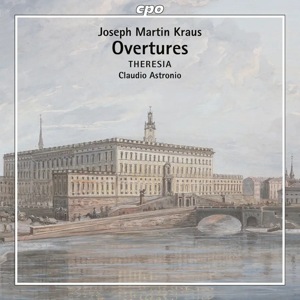
Joseph Martin Kraus (1756-1792)
Overtures
Theresia/Claudio Antonio
rec. 2019/23, Sala Filarmonica, Rovereto, Italy; Auditorium San Romualdo, Ravenna, Italy
cpo 5555792 [68]
Kraus has been labelled “the Swedish Mozart”, and not just because of the similarity of their birth and death years. The quality of Kraus’s music should not be underestimated. A decade or so ago, Naxos released a number of CDs under the banner of the “18th Century Symphony”, and while the music was undeniably pleasant, much of it was fairly forgettable. One particular exception was Joseph Kraus, whose symphonies featured on four discs (review). These contained plenty of music that has much in common with Mozart stylistically, but also a quality that allows the two to be at least mentioned in the same sentence.
Kraus was a devotee of the Sturm und Drang movement, and many of the eleven works presented on this new release are of this style. While I couldn’t see any indication that any are first recordings, for at least two, this is the only listing on Presto. Having praised Kraus in the previous paragraph, let me temper expectations somewhat. While Kraus was very good at invoking moods in his music, especially stormy and tense ones, melody wasn’t his strong point. As evocative as these works, in general, are, you are probably not going to finish the disc humming something memorable, but you will have enjoyed yourself.
Kraus’s 1783 opera Æneas i Cartago, which tells the story of Dido and Aeneas (in six acts no less), provides three separate pieces here. He used the two overtures as “calling cards” when he visited Vienna in 1783, where he met his idol Gluck. Naxos released a full disc of orchestral music from the opera, which I haven’t heard but our reviewers were complimentary (review). All three pieces on the disc under consideration are very fine, with the Introduction to the final act being perhaps the most impressive.
King Gustav III of Sweden, for whom Kraus wrote both birthday and funeral music, was the king assassinated at a masked ball, and the inspiration for Verdi’s opera. The birthday overture is suitably celebratory with timpani and brass, while the Funeral pieces are not as solemn as you might expect, more noble, honouring the dead King.
Of the other overtures, that from Olympie is the most impressive, but interestingly, I found considerable similarities to the overture from Mozart’s Don Giovanni, which was written six years before Kraus’s work. I assume that he would have known Mozart’s masterpiece, and it surprises me that some reference at least wasn’t made in the otherwise excellent notes.
One small niggle, which is almost so minor that I am unsure about mentioning it: in two instances, separate sections from the same work are programmed on the disc in a way that seemed illogical to me. The Overture to Æneas i Cartago is the first track on the disc, but the two other excerpts from this opera appear midway through, with the Introduction to Act V coming before the Overture to Act 1. The two pieces taken from the Funeral Cantata for Gustav III, while presented in the “correct” order, are separated by two overtures from totally different works. The booklet explains the reason for this: “the overtures … have been arranged according to a palindromic sequence arranged mainly by key”. Hmm.
The Theresia orchestra plays period instruments, but even the most averse to this practice should not be deterred. Certainly the sound they produce is not as rich as that of the Swedish Chamber Orchestra on Naxos (comparing the two versions of the Olympie overture), but it gives the music a real sense of drama and tension. What is even more impressive is that Theresia is a youth orchestra, with no member being older than twenty-eight. The booklet notes are very comprehensive, informative and well-written, the latter not always being the case with this label. The sound quality is also very good, again not always the case for orchestral music with this label.
As a through-listen, it does suffer from the inevitable bittiness of excerpts from different larger works, not made easier by the absence of a chronological progression, due to the questionable programming decision. However, if you haven’t heard Kraus’s music before, this would be a very good place to start, and for those with some experience of the composer, you will undoubtedly be impressed by these performances.
David Barker
If you purchase this recording using a link below, it generates revenue for MWI and helps us maintain free access to the site


Contents
Æneas i Cartago: Prologue and Act 1 Overtures & Act V Introduction [VB 23]
Overture to Fiskarena [VB 40]
Overture to Olympie [VB 33]
Overture to Soliman II [VB 22]
Overture to Äfventyraren [VB 32]
Funeral Cantata for Gustav III: Introductions to Parts 1 & 2 [VB 42]
Overture to the cantata for the birthday of Gustav III [VB 41]
Overture to Proserpin [VB 19]

















